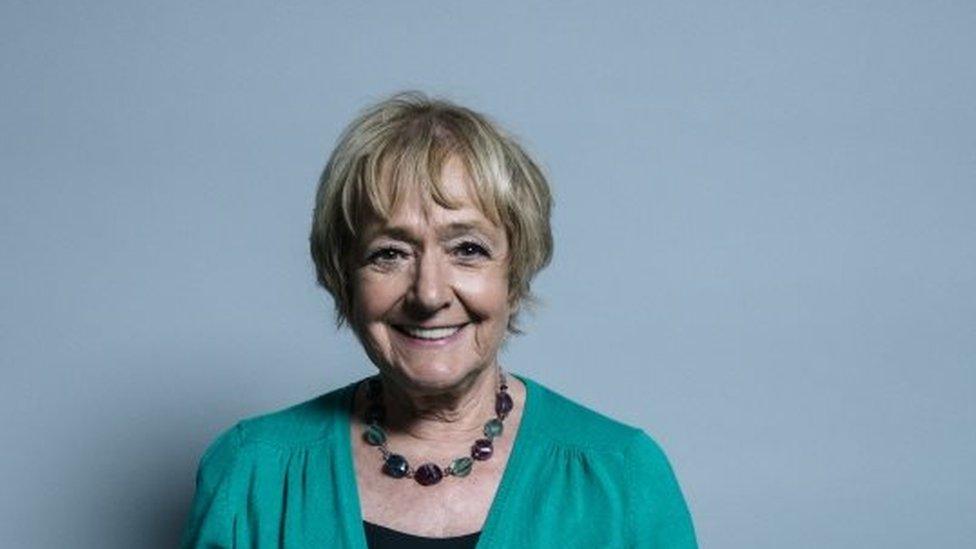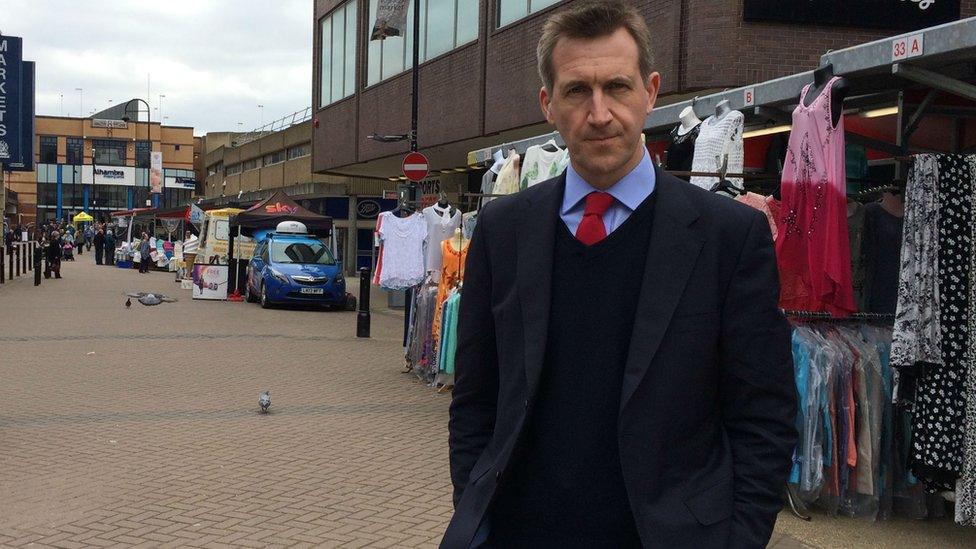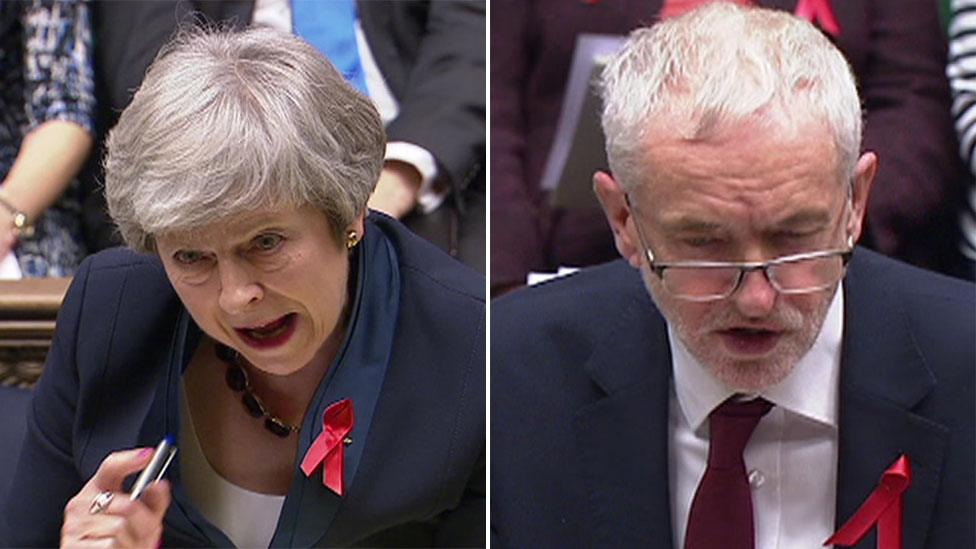Week ahead in Parliament
- Published

International Women's Day takes centre stage on Thursday
Hmmmm. A rather thin-looking programme in the Commons next week provides plenty of opportunities to drop in significant ministerial statements and even a snap "meaningful vote" on the PM's Brexit deal - if she can negotiate some compromise safeguards which might defuse objections to the Northern Ireland backstop provision.
There is talk that Brexiteer minds have been concentrated wonderfully by Labour's adoption of a second referendum, so that those who helped vote down the original incarnation of the deal back in January might now be prepared to hold their nose, grit their teeth and swallow the medicine, and vote it through in an orgy or rueful metaphors.
We shall see.
There are some, like the Maastricht veteran Sir Bill Cash, whose objections to the deal go well beyond the backstop issue.
He is concerned that the UK would effectively surrender its law-making powers to the EU for a transitional period which could last three years or more.
But the suggested timeline is that the PM could put her reheated deal to the Commons, with the Attorney General Geoffrey Cox on hand to assure MPs that there were safeguards and assurances in place so that the backstop provision did not lock the UK into the EU for all eternity.
This might entail statements from both - and therefore cross-questioning by MPs, followed by a debate and a (meaningful) vote.
If enough MPs were placated, The Deal could be passed; if they rejected it, the process outlined by the PM this week would then be triggered.
First there would be a vote on whether to leave the EU without a deal - an option which most expect to be rejected by a vast majority. Then there would be a vote on whether to seek a postponement of Brexit. The Prime Minister wants to request a short extension of the negotiating period, to May 23 (thereby avoiding having to hold European Parliament elections) but will probably face an amendment calling for a longer delay.
Then suppose the EU rejected a short postponement and insisted on a longer delay - might the PM return to Parliament and put the choice between her deal and that longer delay before MPs? At this point the prospect of political turmoil echoing through the May local elections and then into European Parliament elections, would confront them. The EU would insist that if the UK is still in, then elections must be held - not least for fear of a legal challenge, if they were not - and MPs would fear a surge for pro and anti-Brexit forces in those elections, which could turn them into a de-facto second referendum..... destabilising their increasingly splintered parties.
Al of the above is pure speculation at this point. There are plenty of voices saying there will not be any snap announcements or votes next week. But the experience of the last few months is that these things are denied and ruled out, right up to the moment when they are confirmed and scheduled. So however light the current parliamentary agenda appears, keep your eyes peeled.
Other than that, look out for significant action on Monday over tax havens in British Overseas Territories, and for some awkward votes in the Lords on the long-delayed Trade Bill.
Monday 4th March

Dame Margaret Hodge spearheads a crackdown on 'dirty money'
The Commons week begins at 2.30 pm with Housing, Communities and Local Government Questions - with the usual crop of post-weekend ministerial statements and urgent questions following after an hour.
The day's main legislation is the Report and Third Reading stages of the Financial Services (Implementation of Legislation) Bill, which puts the existing EU regulatory framework into UK law.
The big event here is the cross party amendment spearheaded by the campaigning duo of Labour's Dame Margaret Hodge and the Conservative former International Development Secretary Andrew Mitchell, for a public register of beneficial ownership of companies in the British Overseas Territories and Crown Dependencies.
The two have long campaigned for more transparency over who owns assets in the UK - to ensure that "dirty money" the proceeds of organised crime and corruption, cannot be laundered into, for example, property in Britain.
The Territories and Dependencies are vehemently opposed, but the government may be unable to resist this amendment.
The list of names includes an impressive array of Conservative backbenchers, as well as Opposition names - including Foreign Affairs Committee chairman Tom Tugendhat (whose Committee is conducting an inquiry into the Crown Dependencies), former Brexit Secretary David Davis, former Chancellor Kenneth Clarke, ex-minister Sir Oliver Letwin - and Mr Mitchell, a former chief whip, believes they have the numbers to win.
It will be interesting to see how many MPs have signed the amendment by Monday - but this could well produce a serious row on the floor of the House.
After that, MPs move on the annual motion on Social Security Benefits Uprating - some benefits are uprated in line with inflation, and others in line with average earnings.
Keep an eye on ministers language about the basic state pension; the government has given a commitment to "triple lock" the increase, to by the highest out of the growth in earnings, inflation, or 2.5%.
This time the highest figure is the increase in earnings (2.6%) but there is a school of thought that the "Triple Lock" cannot be sustained for ever - and there may well be questions about the government's longer-term intentions.
In Westminster Hall at 4.30 pm MPs debate e-petition 232220 on school funding: "Schools are having to make difficult choices on how to spend their limited funding as their income has not kept pace with the rise in costs since 2010. All schools are working very hard to "make ends meet" but this is becoming increasingly difficult and verging on almost impossible."
This attracted 103,364 signatures fro members of the public, just above the threshold that means a petition is considered for debate.
My pick from the committee corridor is the opening session of the Housing, Communities and Local Government Committee's new inquiry into Modern Methods of Construction (MMC).
Can techniques like off-site manufacturing produce cheaper, better homes, more rapidly?
According to the government's industrial strategy, MMC has the potential to reform the residential construction sector so as to meet its target of 300,000 new homes each year, and 1 million between 2017 and 2020.
In the Lords at 2.30pm questions to ministers include the Crossbencher Baroness Meacher asking about access to medicinal cannabis on prescription.
A rapid waving through of the third reading of Lord Hunt of Wirral's private members bill, the Parking (Code of Practice) Bill will follow, and then peers turn to their second day of detailed consideration of the Offensive Weapons Bill.
The key issues are on defending the UK knife industry (especially Sheffield) through the Trusted Trader scheme, Sikh Kirpans (ceremonial daggers), and reinstating the ban on high-powered guns.
The dinner break business is a regret motion from the Green Party peer, Baroness Jones, against a Statutory Instrument on feed-in tariffs.
Tuesday 5th March

Labour's Dan Jarvis will call for more regional investment
Commons business opens at 11.30 am with Treasury Questions - although with the Chancellor's Spring Statement due the following week (unless displaced by the big Brexit votes announced by the prime minister) rather a lot of questions may be batted aside with a "wait and see" answer.
The day's Ten Minute Rule Bill, from the Conservative Philip Davies, is on female succession to hereditary titles - asking for the abolition of male primogeniture for hereditary titles.
Under current law, first born daughters are discriminated against in favour of younger brothers and therefore women are, with a tiny number of exceptions, not entitled to stand in the by-elections for the 92 hereditary seats in the House of Lords.
The bill has cross-party support including from Maria Miller, the Chair of the Women and Equalities Select Committee.
Then MPs turn to the Northern Ireland Budget (Anticipation and Adjustment) (No. 2) Bill - a measure to set government spending in Northern Ireland, in the absence of an Assembly or devolved executive.
The adjournment debate, led by the SNP's Drew Hendry, is on the families of commonwealth soldiers - last week he raised the case of L/Cpl Denis Omondi, who is stationed in his constituency, and who has been refused permission to bring his 14-year-old daughter, Ann, to Scotland.
In Westminster Hall subjects for debate include the future of Catholic sixth form colleges, at 930am.
Labour MP Gareth Thomas will argue that they face "double discrimination" under the government's funding system for post-16 education.
Because they are not academies, they receive less funding than colleges which have converted to academy status, but even if they wanted to become academies they cannot do so.
The government has been aware of this for a number of years but have done little to address either concern.
Combined with cuts in funding to post-16 education since 2010 this discrimination is raising many questions about the ability of the Catholic community the secure the long-term future of all 14 Catholic Sixth form colleges.
UK relations with Kosovo - with John Grogan, at 11am. He's chairman of the All Party Parliamentary Group on Kosovo, and as well as praising the UK's role in helping it rebuild, he wants to signal opposition to the idea of territory swaps with neighbouring countries - an idea which he believes could have dire implications for the wider Balkans.
South Yorkshire Mayor and Labour MP Dan Jarvis leads a debate on investment in regional transport infrastructure at 2.30 pm. He will argue that transport infrastructure is critical for productivity and that there is a systemic unfairness in the way funding is allocated for projects at a regional level.
He wants powers to be devolved so that regions can address problems locally.
At 4pm, Conservative MP Antoinette Sandbach leads a debate on the effect on the solar industry of the replacement of the feed-in tariff - The Government has recently ended the feed-in-tariff and the export tariff, and she is keen to press for replacement plans, particularly for small energy producers.
She will be calling for a minimum floor price to protect them..
My committee pick is the Digital, Culture, Media and Sport session, at 10.30 am, on Immersive and addictive technologies.
The witnesses include British YouTube personality Dan TDM, whose online video channel covers video games, particularly Minecraft, and James Good and Matus Mikus, Game Quitters.
In the Lords, at 2.30 pm, peers vote on the Draft Social Security Benefits Uprating Order discussed by MPs on Monday, and then rattle through a series of Statutory Instrument (SI) approval motions: the first on local election expenses in Northern Ireland; then four EU Exit SIs (to be taken together) on social security co-ordination.
This is followed by an EU Exit SI on financial services and markets and then two EU Exit SIs (to be taken together) on Gibraltar financial services and other miscellaneous issues.
Then comes three EU Exit SIs (to be taken together) on financial services - distance marketing, mortgage credit and financial regulators powers. Enjoy.
Wednesday 6th March

The Commons day opens at 11.30 am with half an hour of Northern Ireland questions, followed by Prime Minister's Question Time, at noon.
The day's Ten Minute Rule Bill, from Labour's Susan Elan Jones, aims to provide the right to time off work for charity trustees to carry out their duties.
Next comes a piece of Parliamentary formality, postponed from February, the motion to approve the appointment of Gareth Davies, the new Comptroller and Auditor General, the head of the powerful financial watchdog, the National Audit Office.
He replaces Amyas Morse, whose 10-year term of office is coming to an end.
The importance of the appointment is reflected in the level of parliamentary ritual involved; the CAG is the Crown's wastefinder-general, running the NAO, and advising the inquiries of the powerful public accounts committee. the post is very senior - the holder gets letters patent from the Queen - so the motion confirming the appointment is moved by the prime minister, and IS followed by speeches from the chair of the pubic accounts committee, Labour ex-minister Meg Hillier, a Treasury minister and a shadow minister.
After that comes another Northern Ireland Bill - the Northern Ireland Regional Rates and Energy (No. 2) Bill, which sets the domestic and non-domestic rates and deals with the scandal-hit renewable heat incentive scheme.
In Westminster Hall, debates include a new attempt by Labour MP Andy Slaughter to extending the Freedom of Information Act to cover housing associations and public contractors (2.30 pm).
Mr Slaughter had an unsuccessful private members bill on this issue last year - and he plans to highlight calls from the Information Commissioner to bring public contractors like Carrillion and housing association run buildings like Grenfell under FOI.
My Committee pick is the Public Accounts evidence session on Crossrail: progress review (2.30 pm). Another day, another troubled infrastructure project.
In the Lords, at 3pm, it is probably the biggest day of the week in the Upper House, as peers embark on the long-awaited report stage of the Trade Bill. This could well include moves to require the government to seek a customs union with the EU - likely to be forced to a vote, and to seek UK membership of the European Free Trade Association and the European Economic Area.
The key issues include Parliamentary scrutiny of trade deals, Northern Ireland, tariffs and pet travel.
There will also be a short debate on improving the swimming and life-saving skills of children provided through schools.
Thursday 7th March
MPs open at 9.30 am with 40 minutes of digital, culture, media and sport questions, which will be followed by a mini-Question Time for the Attorney General, Geoffrey Cox - now emerging as a key Brexit player.
Then comes the weekly Business Statement from the Leader of the House - Andrea Leadsom
The main debate is on International Women's Day, followed by a backbench business committee debate on the opportunities and challenges facing the modern Commonwealth in its 70th year
In Westminster Hall, at 1.30 pm, MPs debate the environment, food and rural affairs committee report on controlling dangerous dogs.
My Committee pick is the health and social care evidence session on the availability of Orkambi, a precision medicine to be licensed for use in the UK by people with cystic fibrosis, but not available on the NHS, at 10.15 am. The witnesses include patient and clinician representatives nominated by the Cystic Fibrosis Trust, and NHS England, plus officials from the manufacturer, Vertex Pharmaceuticals.
In the Lords (11 am) questions to ministers have an International Women's Day theme: Baroness Jenkin of Kennington asks about reducing the risk of female genital mutilation for girls in the UK and internationally, Baroness Gale asks about bringing section 106 of the Equality Act 2010 into force and Baroness Falkner of Margravine asks about increasing the number of black and minority ethnic women in leadership positions in universities.
Then peers rattle through another five EU Exit SIs, the first on EU qualifications for health and social care staff; and the second on EU qualifications for Pharmacists. These are followed by three SIs (to be taken together) on Human Medicines; Clinical trials; and on Medical Devices.
The main debate is on International Women's Day.
Neither House sits on Friday 7th.
- Published30 July 2019

